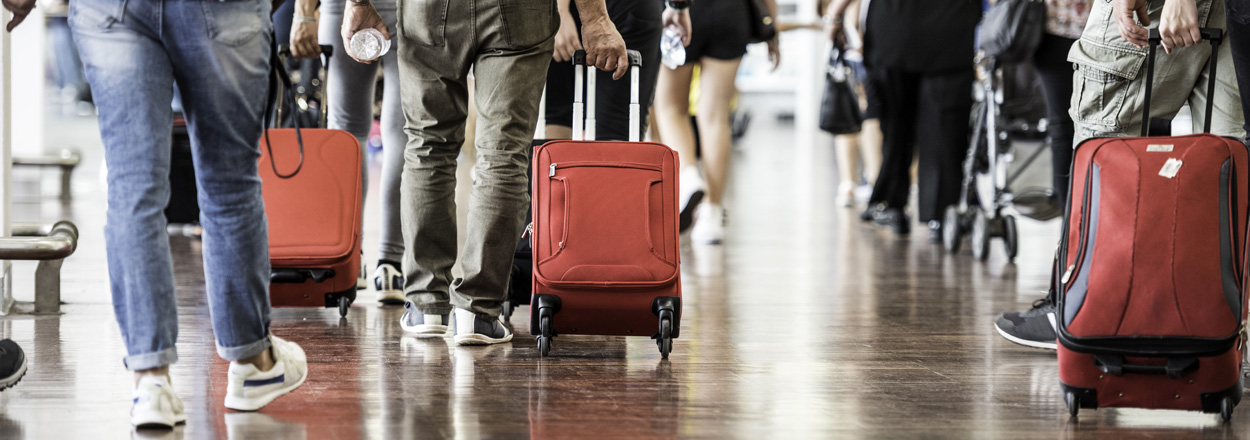
Travel insights from Andrea Sedlacek, editor of The Compass
How TSA’s Use of Facial Recognition Could Affect Travelers
The Transportation Security Administration (TSA) recently revealed its plan to use facial biometrics, aka facial recognition, to enhance security and improve travelers’ experiences. It seems as though TSA knows that the experience at U.S. airports is not great, since they’re continuously trying to improve it.
Their four-point plan lays the roadmap for their “efforts to modernize aviation passenger identity verification in the coming years,” according to the press release. The four goals outlined on the roadmap are:
- Partnering with U.S. Customs and Border Protection (CBP) on biometrics for international travelers.
- Using biometrics provided by TSA Pre Check members to enhance the travel experience.
- Expanding biometrics to additional domestic travelers.
- Developing the infrastructure for biometric technology.
TSA’s increased use of biometrics really shouldn’t be surprising though, since U.S. Customs and Border Protection has been using facial biometrics for a while now. Some airports only use it for travelers exiting the country and some only use it for travelers entering the country. You have probably experienced facial biometrics if you’ve flown internationally to or from any of these airports:
Exiting the U.S.
- Atlanta (ATL)
- Boston (BOS)
- Chicago O’Hare (ORD)
- Detroit (DTW)
- Dulles (IAD)
- Houston Hobby (HOU)
- Houston Intercontinental (IAH)
- John F Kennedy (JFK)
- Las Vegas (LAS)
- Los Angeles (LAX)
- Miami (MIA)
- Orlando (MCO)
- San Francisco (SFO)
- Seattle (SEA)
Entering the U.S.
- Atlanta (ATL)
- Dulles (IAD)
- Ft. Lauderdale (FLL)
- Houston (IAH)
- John F Kennedy (JFK)
- Los Angeles/Tom Bradley (TBIT)
- Miami (MIA)
- Orlando (MCO)
- San Diego (SAN)
- San Jose (SJC)
In October, Delta Airlines launched the first biometric terminal at Hartsfield-Jackson Atlanta International Airport, allowing passengers to check-in, go through security and board their flight without needing to scan their passport or boarding documents. The technology is expected to be used throughout ATL’s international terminal by December 1, 2018.
Though it may feel a little creepy at first to use your face to get through the airport and on to a flight, people are already using their faces to unlock their phones and Facebook uses it to suggest who to tag in photos. So if it can be used to make your airport experience better, maybe it’s not so scary.
You May Also Like
Is the Government Shutdown Affecting Travelers’ TSA Experience?
The government shutdown began on Dec. 22 and the actual impact on air travel and airport security throughout the U.S. varies from source to source. Naturally, everyone has a different perspective on what’s actually happening. The Transportation Security Administration (TSA) is impacted by the govern
TSA Screens Record Number of Passengers Since March 2020
In an exciting sign of the travel industry’s recovery, the Transportation and Security Administration (TSA) reported screening 1.36 million passengers on Friday, March 12, the most passengers they’ve screened in one day since March 15, 2020. On the same day last year, TSA screened 1.79 million passe
TSA Pre Check: You Can Leave Your Shoes On
Want to make travel even easier for your clients? Encourage them to apply for TSA Pre Check and even walk them through the application process. They'll be on that charter to Punta Cana in no time, without having to take off their shoes! TSA Pre Check Basics TSA Pre Check is a program that gives trav
TSA Reaches Milestone: 1 Million Passengers Screened in 1 Day
On October 19, 2020, the Transportation Security Administration (TSA) announced that they screened over 1 million passengers on Sunday October 18, 2020. TSA had not reached the milestone of screening 1 million passengers in a single day since March 17, 2020. The line graph below makes it easy to see